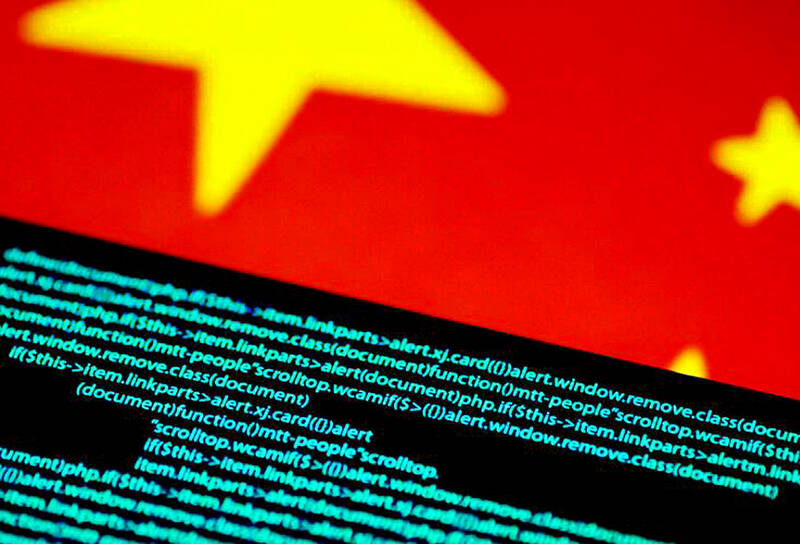Scientists and researchers participating in projects that would be launched under the soon-to-be established Taiwan Academic Cybersecurity Center must not have participated in studies or projects funded by the Chinese, Hong Kong or Macanese governments, the Executive Yuan said.
The center, which is to be operated by the National Science and Technology Council, is part of Taiwan Information Security Excellence Program approved by the Executive Yuan.
It is to set up branch offices at universities and focus on researching information security issues. Preparations to launch the center are to begin next month.

Photo: Reuters
SEVEN KEY AREAS
Based on the council’s plan, the center is to target research in seven key areas: artificial intelligence information security, satellite security protection, chip security, post-quantum cryptography, zero trust architecture, resilient networks and next-generation mobile network security.
The council said it would use Taiwan’s advanced semiconductor industry to develop information security technologies, including in authentication, identification and encryption.
Technical verification would be conducted at the Shalun Information Security Service Base in Tainan, it said.
SECURITY REQUIREMENTS
The council would require that project hosts and cohosts as well as full-time personnel on research projects have never participated in research or subsidy programs run by China, Hong Kong or Macau.
They must also have not held teaching positions in China, Hong Kong or Macau in the past five years, including full-time and part-time positions.
All participants in the center’s projects must not have Chinese, Hong Kong or Macanese citizenship, and must not have studied for a degree in China.
The US Department of Commerce is reportedly to organize an information security-related delegation to Taiwan in September.
HIGH VALUE
The output value of Taiwan’s asset security reached NT$60.35 billion (US$1.97 billion) in 2021, and the compound annual growth rate of the asset security output value from 2016 to last year was 11.3 percent, Executive Yuan data showed.
The nation has 50 manufacturers of information security-related products and services, which employ about 9,000 workers.
The structure of the information security industry shows that hardware accounts for 51.3 percent, software accounts for 9.1 percent and services account for 39.6 percent.

A magnitude 5.6 earthquake struck off the coast of Yilan County at 12:37pm today, with clear shaking felt across much of northern Taiwan. There were no immediate reports of damage. The epicenter of the quake was 16.9km east-southeast of Yilan County Hall offshore at a depth of 66.8km, Central Weather Administration (CWA) data showed. The maximum intensity registered at a 4 in Yilan County’s Nanao Township (南澳) on Taiwan’s seven-tier scale. Other parts of Yilan, as well as certain areas of Hualien County, Taipei, New Taipei City, Taoyuan, Hsinchu County, Taichung and Miaoli County, recorded intensities of 3. Residents of Yilan County and Taipei received

Taiwan has secured another breakthrough in fruit exports, with jujubes, dragon fruit and lychees approved for shipment to the EU, the Ministry of Agriculture said yesterday. The Animal and Plant Health Inspection Agency on Thursday received formal notification of the approval from the EU, the ministry said, adding that the decision was expected to expand Taiwanese fruit producers’ access to high-end European markets. Taiwan exported 126 tonnes of lychees last year, valued at US$1.48 million, with Japan accounting for 102 tonnes. Other export destinations included New Zealand, Hong Kong, the US and Australia, ministry data showed. Jujube exports totaled 103 tonnes, valued at

TRUST: The KMT said it respected the US’ timing and considerations, and hoped it would continue to honor its commitments to helping Taiwan bolster its defenses and deterrence US President Donald Trump is delaying a multibillion-dollar arms sale to Taiwan to ensure his visit to Beijing is successful, a New York Times report said. The weapons sales package has stalled in the US Department of State, the report said, citing US officials it did not identify. The White House has told agencies not to push forward ahead of Trump’s meeting with Chinese President Xi Jinping (習近平), it said. The two last month held a phone call to discuss trade and geopolitical flashpoints ahead of the summit. Xi raised the Taiwan issue and urged the US to handle arms sales to

BIG SPENDERS: Foreign investors bought the most Taiwan equities since 2005, signaling confidence that an AI boom would continue to benefit chipmakers Taiwan Semiconductor Manufacturing Co’s (TSMC, 台積電) market capitalization swelled to US$2 trillion for the first time following a 4.25 percent rally in its American depositary receipts (ADR) overnight, putting the world’s biggest contract chipmaker sixth on the list of the world’s biggest companies by market capitalization, just behind Amazon.com Inc. The site CompaniesMarketcap.com ranked TSMC ahead of Saudi Aramco and Meta Platforms Inc. The Taiwanese company’s ADRs on Tuesday surged to US$385.75 on the New York Stock Exchange, as strong demand for artificial intelligence (AI) applications led to chip supply constraints and boost revenue growth to record-breaking levels. Each TSMC ADR represents